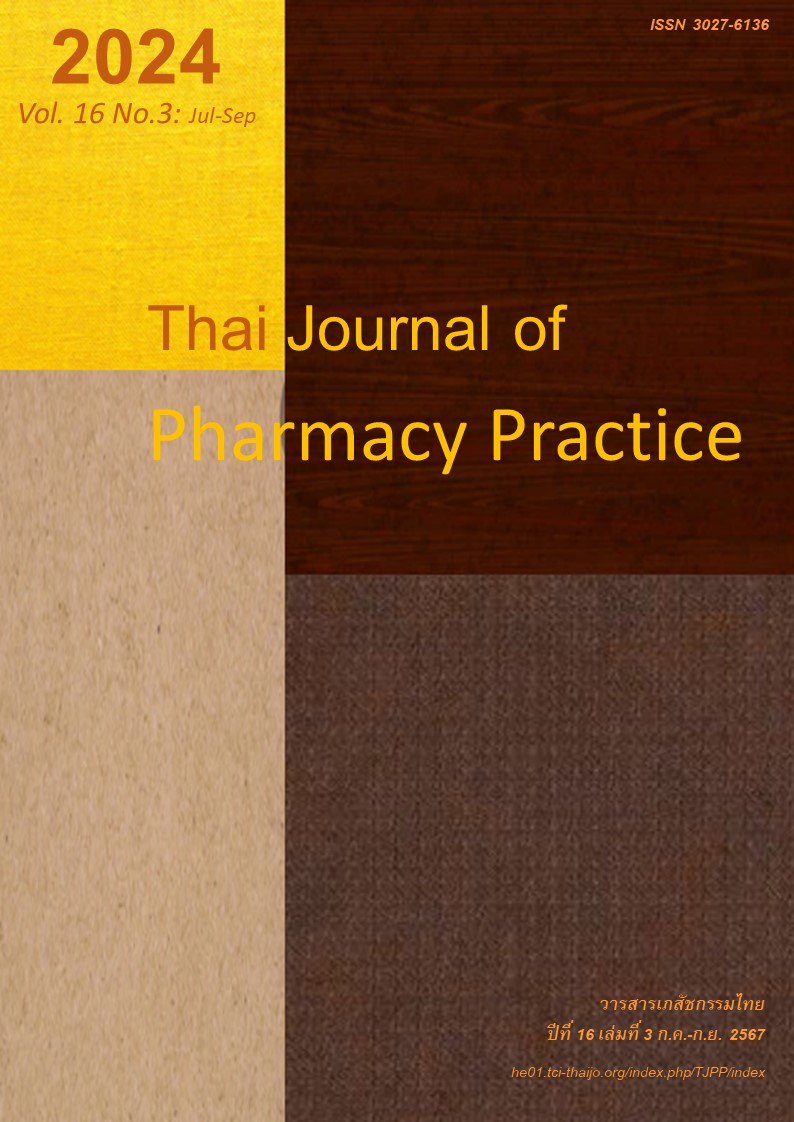Relationships of Servicescape and Service Quality with Customer Loyalty in Good Pharmacy Practice Accredited Independent Pharmacies
Main Article Content
Abstract
Objective: To investigate the relationship of servicescape and service quality with customer loyalty in Good Pharmacy Practice (GPP) accredited independent pharmacies. Methods: This research was an analytical cross-sectional survey. The respondents consisted of customers who were age over 18 years old and visited or purchased products from 8 selected GPP accredited independent pharmacies in Bangkok metropolis between February and July 2021. The subjects completed self-administered questionnaires after receiving service. The questionnaires assessed the opinions toward servicescape and service quality of GPP accredited pharmacies and opinions on three customer loyalty behaviors including word of mouth (WOM), purchase intention (PI) and price sensitivity (PS). Results: 384 pharmacy customers responded to the questionnaires. 91.14 % of respondents were repeat customers. The customers rated their experiences at pharmacies in term of servicescape and the service quality at 4.23±0.52 and 4.34±0.54 out of five, respectively. Overall servicescape and service quality significantly correlated to all domains of customer loyalty i.e., WOM, PI and PS (P < 0.05). Overall servicescape had a weak but significantly positive correlation to WOM (r = 0.33) and PI (r = 0.26) while it showed a weaker correlation to PS (r = 0.10). Additionally, service quality moderately correlated to both WOM (r = 0.53) and PI (r = 0.47) while it revealed a weaker association with PS (r = 0.31). Conclusion: service quality and servicescape are potential critical drivers of customer loyalty in GPP accredited independent pharmacies in terms of WOM, PI and PS.
Article Details

This work is licensed under a Creative Commons Attribution-NonCommercial-NoDerivatives 4.0 International License.
ผลการวิจัยและความคิดเห็นที่ปรากฏในบทความถือเป็นความคิดเห็นและอยู่ในความรับผิดชอบของผู้นิพนธ์ มิใช่ความเห็นหรือความรับผิดชอบของกองบรรณาธิการ หรือคณะเภสัชศาสตร์ มหาวิทยาลัยสงขลานครินทร์ ทั้งนี้ไม่รวมความผิดพลาดอันเกิดจากการพิมพ์ บทความที่ได้รับการเผยแพร่โดยวารสารเภสัชกรรมไทยถือเป็นสิทธิ์ของวารสารฯ
References
Kasikorn Research Center. Pharmacies or drug stores [online]. 2015 [cited Feb 16, 2023]. Available from: thaipublica.org/wp-content/uploads/2016/06/ประมาณการธุรกิจขายยา.pdf.
Tunpaiboon N. Industry outlook 2021 - 2023: pharmaceuticals [online]. 2021 [cited Feb 16, 2023]. Available from: www.krungsri.com/en/research/indu stry/industry-outlook/chemicals/phamaceuticals/io/i o-pharmaceuticals-21.
Medicines Regulation Division. The number of licenses for drugstore business in 2020 [online]. 2020 [cited Jan 20, 2021]. Available from: www.fda. moph.go.th/sites/drug/Shared%20Documents/Statistic/Licensee-20201230.pdf.
Food and Drug Administration. Self-assessment GPP drugstores [online]. 2020 [cited Apr 20, 2020]. Available from: www.fda.moph.go.th/sites/drug/GP PPageFile/Operator/Self-Assessment-GPP-DrugSt ore.pdf.
Bitner MJ. Servicescapes: The impact of physical surroundings on customers and employees. J Mark 1992; 56: 57-71.
Preedakorn P, Laorithirat S. Pharmacy business development through business networking. APHEIT International Journal 2016; 5: 56-65.
Panyatiyakul W. Business plan of “MAK-KWA-YA” drug store [master thesis]. Prathumthani: Thamma- sart University; 2018.
Kotler P, Keller KL. Marketing management. 14th ed. New Jersey: Pearson Higher Education; 2012.
Reichheld FF, Markey R, Hopton C. The loyalty effect-the relationship between loyalty and profits. Eur Bus J 2000; 12: 134-9.
Reichheld F, Detrick C. Loyalty: A prescription for cutting costs. Mark Manag 2003; 12: 24-5.
Parasuraman AP, Zeithaml VA, Berry LL. SERVQUAL: a multiple-item scale for measuring consumer perceptions of service quality. J Retailing 2002; 64: 12-40.
Chokbumrungsuk C, Anuwong K, Poomtong S. The relationship between perceived service quality and service loyalty in drug stores, Bangkok. Thai Journal of Pharmacy Practice 2009; 1: 23-33.
Praditbongkotch A, Vannavanit Y. Factors influen cing consumer loyalty to drug store in Bangkok metropolis. Srinakharinwirot Business Journal 2017; 8: 55-64.
Zeithaml VA, Berry LL, Parasuraman A. The behavioral consequences of service quality. J Mark 1996; 60: 31-46.
Faul F, Erdfelder E, Lang A-G, Buchner A. G* Power 3: A flexible statistical power analysis program for the social, behavioral, and biomedical sciences. Behav Res Methods 2007; 39: 175-191.
Heinrich-Heine-Universitat Dusseldorf: G*Power statistical power analyses for Mac and Window [online]. 2020 [cited Jun 9, 2023]. Available from: www.psychologie.hhu.de/arbeitsgruppen/allgemeine-psychologie-und-arbeitspsychologie/gpower.
Cohen J. Statistical power analysis for the behavio- ral sciences. 2nd ed. New Jersey: Lawrence Erlbaum; 1988.
Cohen J. Quantitative methods in psychology: a power primer. Psychol Bull 1992; 112: 155-9.
Sanitlou N, Sartphet W, Naphaarrak Y. Sample size calculation using G*power program. Journal of Suvarnabhumi Institute of Technology (Humanities and Social Sciences) 2019; 5: 496-507.
Phasunon N, Phasunon P. Response rate in quanti- tative research. Journal of Humanities and Social Sciences Thonburi University 2019; 13: 181-8.
Bunajinda L. Client and pharmacist perceptions about community pharmacy service quality [master thesis]. Bangkok: Chulalongkorn University; 2004.
Drost EA. Validity and reliability in social science research. Educ Res Perspect 2011; 38: 105-23.
Hair JF, Babin B, Money AH, Sameoul P. Research method for business. 5th ed. United State: John Wiley & Sons; 2010.
Thanawatsakarn M. Factors affecting customer loyalty of independent pharmacies in Bangkapi district, Bangkok [master thesis]. Bangkok: Srina kharinwirot University; 2015.
Kulchanachutiporn Y. The influences of perceived quality value service quality, and perceived price value on satisfaction, relationship quality, word of mouth and customer repurchase of drug store in Bangkoknoi Bangkok [Master's thesis]. Bangkok: Bangkok University; 2019.
Hasitpanichkul N, Jadesadalug V. The impacts of the pharmacy accreditation development according to the Pharmacy Council standards towards customer response, competitiveness, and perfor mance of pharmacies in Nakhon Pathom. Journal of Community Development Research (Humanities and Social Sciences) 2014; 7: 1-20.


